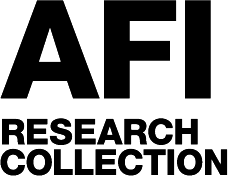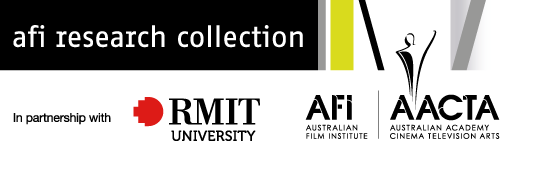
RMIT Culture is pleased to announce the 2024/25 AFI Research Collection Fellowship.
The AFI Research Collection (AFIRC) is an essential resource for Australian film and television scholarship. Its holdings encompass a diverse range of research materials and ephemera, including screenplays, production stills, special collections, press kits and soundtracks associated with film and television production in Australia. These unique and specialist collections are supported by comprehensive holdings of books, journals and industry publications from Australia and overseas.
Fellowship Overview
- The Fellowship is intended to promote the unique holdings of the AFIRC through research that results in a published or non-traditional research output.
Research projects might include:
- Scholarly articles or monographs
- Dissertations
- Creative work
- Digital projects
- Film
- Performance-based research
- Exhibition proposals
- Research-based syllabi to grow student research
- Collaborative research
The AFIRC Fellowship is awarded to a unique, collection-centred research project that requires substantial, on-site use of the AFIRC holdings. Projects that focus on addressing significant knowledge gaps within the collection may also be eligible for consideration.
Priority may be given to projects that do not have access to other major funding. Proposals demonstrating the greatest potential for enhancing the reputation and reach of the AFIRC may also be given precedence.
APPLICATION DEADLINE: 11:55pm, Tuesday 30th September 2024
When considering your Fellowship proposal, please take time to look over the AFIRC holdings via the online catalogue to understand the collection’s strengths and limitations . Applicants are also strongly encouraged to review past winners for tips on the scope of projects, previous topics and examples of collection-centred research.
Applicants are also strongly encouraged to contact the AFIRC at afiresearch@rmit.edu.au with specific enquiries about the types of materials they may wish to access during their proposed visit. Enquiries about the collections should be submitted before 23 September 2024 to guarantee a response before the application deadline.
All questions about the fellowship program and/or the application process should be directed to afiresearch@rmit.edu.au.
What support is available?
Depending on the requirements of the applicant, the Fellowship will generally be awarded for the equivalent of a period of between two and six weeks. The Fellowship will include the following in-kind-support:
- Open access to the AFIRC’s holdings and databases.
- Free printing and copying facilities.
AFIRC staff will not serve as research assistants to the Fellow. The AFIRC staff will conduct an orientation tour and staff will be on hand to answer questions but it is expected that the AFIRC Research Fellow will conduct their research independently.
Who may apply?
The AFIRC Fellowship is open to researchers who have a demonstrated interest and experience in Australian screen culture and through evidenced research or AV outputs.
- Ongoing RMIT academic staff are ineligible to apply.
- Previous recipients of the AFIRC Fellowship are eligible to reapply with new projects after two full fellowship cycles have passed.
Diversity
The AFIRC and RMIT University are committed to embracing and encouraging diversity in all of its forms, striving to create an inclusive community that fosters a positive learning, teaching, and working environment.
The AFIRC seeks scholars who engage critically with issues of archival representation and who recognise and address gaps or inequities in current scholarship opportunities. It particularly encourages proposals from candidates who identify as Culturally and Linguistically Diverse (CALD), Diverse Genders, Sexes and Sexualities (DGSS), precariously employed people or people living with disabilities. The AFIRC welcomes contributions from anyone who can support its commitment to diversity as it strives to grow a vitally inclusive research culture.
The AFIRC acknowledges that the representation of Indigenous stories should be told by Indigenous people to enable their perspective and interpretation, in accordance with the AMAGA First Peoples Roadmap. We are especially interested in proposals from Aboriginal or Torres Strait Islander peoples that seek to amplify Indigenous voices, truth-telling and Indigenous representation in the AFIRC holdings.
Selection Criteria
The AFIRC Advisory Panel will assess applications according to the following criteria:
- Effective and demonstrated use of the AFIRC holdings.
- Originality and innovation.
- Relevance and significance.
- Contribution to knowledge.
- Education and industry engagement.
The Advisory Panel will also assess each proposal according to:
- Project viability in regard to scope and anticipated time requirements.
- Potential and/or identified risks.
- Project capacity for a successful outcome.
In some instances, the Advisory Panel may consult external referees to assist in assessing applications.
In assessing applications, the Advisory Panel will also consider the following:
- Applicant qualifications.
- Demonstrated research experience.
- Preliminary investigation of the AFIRC holdings.
- Strength of the research question or artistic concept.
- Research methodology.
- Project contribution to knowledge.
- Proposed Fellowship outcomes.
- Depth of engagement with the Collection.
- Project capacity to promote the AFIRC, research and the fellowship program.
Application Procedures
A complete application consists of a three-page proposal and one or two letters of recommendation as outlined below. These materials must be emailed to AFIRC (afiresearch@rmit.edu.au) as PDF files by the application deadline.
Proposal
Applicants must submit a three-page proposal, as outlined below. The proposal should be in English and saved as a single PDF file, which must be sent via email. Proposals exceeding three pages will not be accepted. Use a minimum font size of 11 points. Each page should have one-inch margins and include your last name in the top-right corner.
When the AFI Research Collection Advisory Panel reviews your application, they will rigorously evaluate your proposal based on the key criteria. These include the effective use of the AFIRC holdings, the originality and innovation demonstrated in your approach, the relevance and significance of your research and the anticipated contribution to knowledge within the field.
- Page one of your proposal must feature your name and project title, along with a concise abstract outlining your research project. Keep in mind that you are writing for an interdisciplinary panel; research topics and their significance should be explained and placed in the context of the larger field of study. Please also describe the anticipated result of the project (journal article, book, edited volume or other format).
- Page two of your proposal should provide a detailed account of your anticipated use of the AFIRC holdings. Describe the materials that you will consult, their relevance to the project and why these materials must be consulted on-site during the length of fellowship requested.
- Page three of your proposal should consist of an abbreviated curriculum vitae emphasising relevant work, including all relevant publications and projects.
Application Deadline
The proposal and required letter(s) of recommendation for 2024–2024 Fellowship must be submitted via email by 11:55pm on 30 September 2024. An email confirmation will be sent to the applicant upon the successful submission of their application. Applicants are responsible for ensuring all required materials have been submitted. Materials cannot be accepted after the deadline has passed.
Announcement of Decisions
Decisions will be announced on 22 October 2024. Fellowship recipients and their research projects will be recognised in AFIRC and RMIT Culture publicity and at the annual AFIRC Fellowship Salon event.
Stipend
The AFIRC Fellowship provides a stipend of up to $5,000 (AUD).
Fellowship Requirements & Outcomes
Recipients of 2024–2025 fellowships must complete their residencies between November 2024 and November 2025.
Preliminary outcomes will be discussed during an introductory interview and can be modified, by mutual agreement, during the course of the Fellowship.
During their fellowship, the AFIRC Fellow will be required to:
- Undertake on-site, collection centered research within the AFIRC.
- Present at least one public lecture, facilitated by RMIT Culture.
- Assist in the promotion of their research, the AFIRC and the Fellowship program
- acknowledge the support of the AFIRC in any publication, performance or presentation resulting from the research.
- Sign an agreement which includes negotiated outcomes.
- Make their own arrangements for personal insurances, travel and accommodation.
At the conclusion of the Fellowship, the AFIRC Fellow will be required to:
- Complete the AFIRC Fellowship evaluation form (to be provided).
- Provide the AFIRC with a copy of any research outcome.
IMPORTANT NOTE: The information contained in this document is provided for general information purposes only and does not have any legal effect. Specific terms of engagement will be negotiated with successful applicants.


